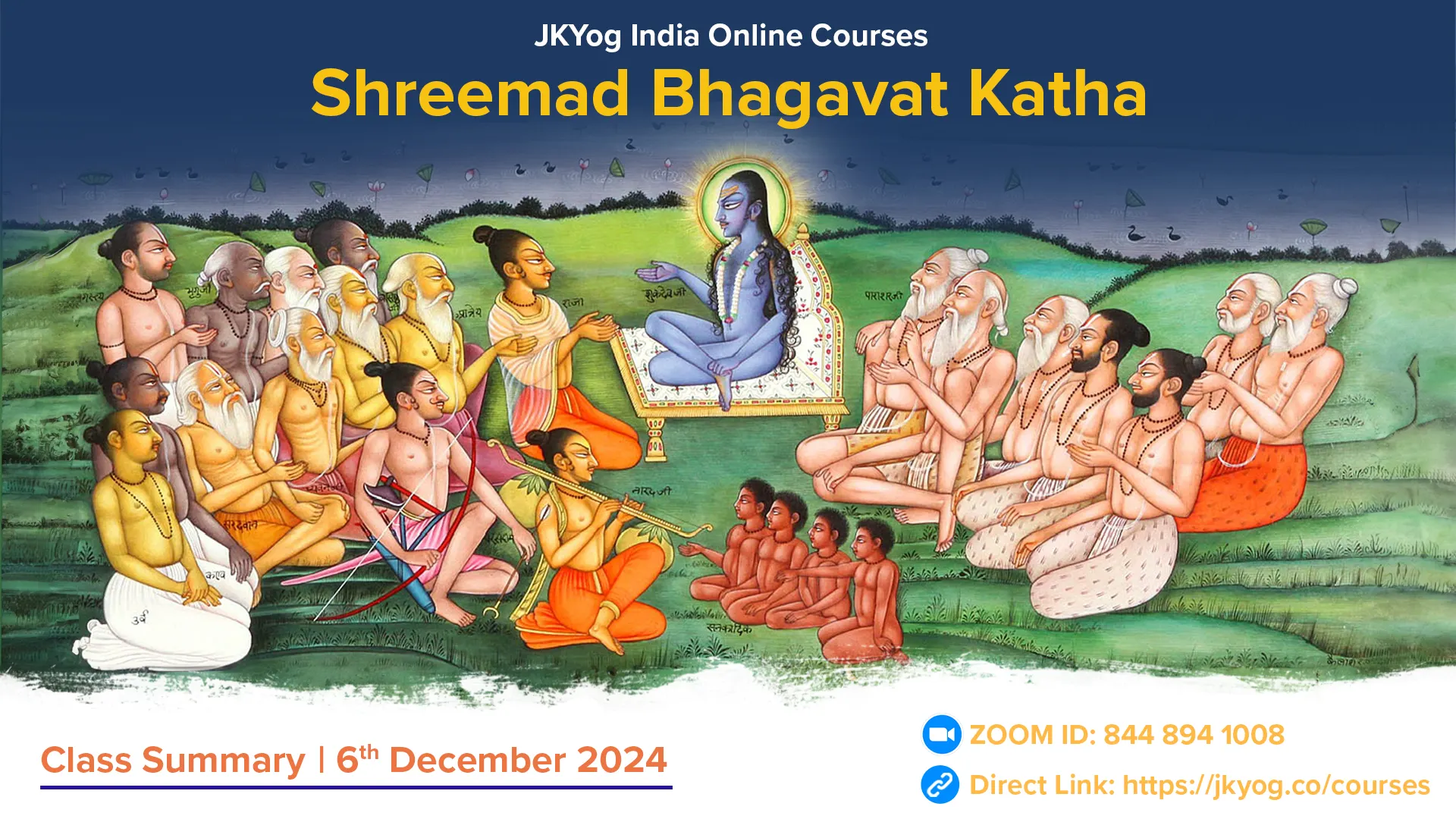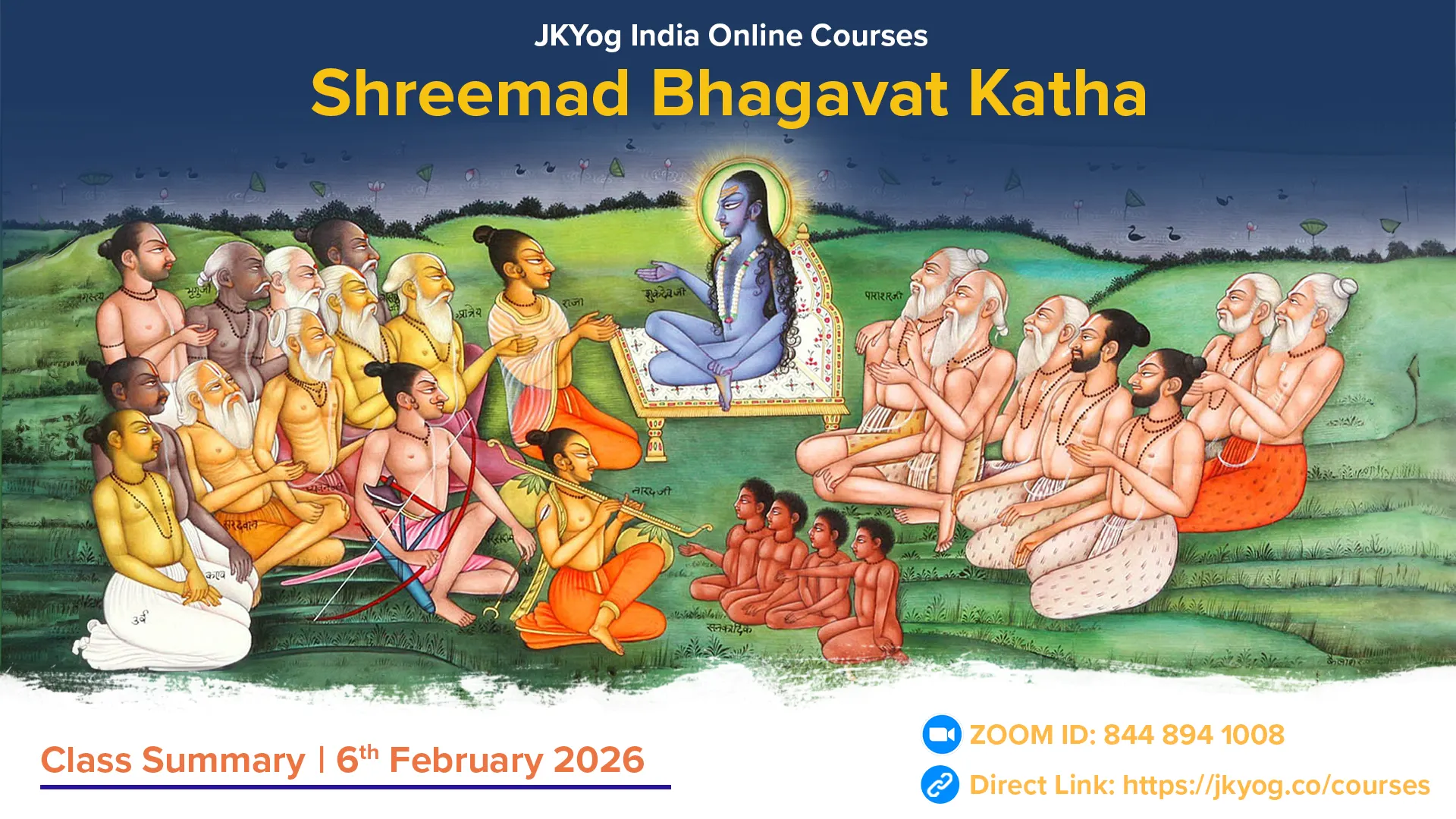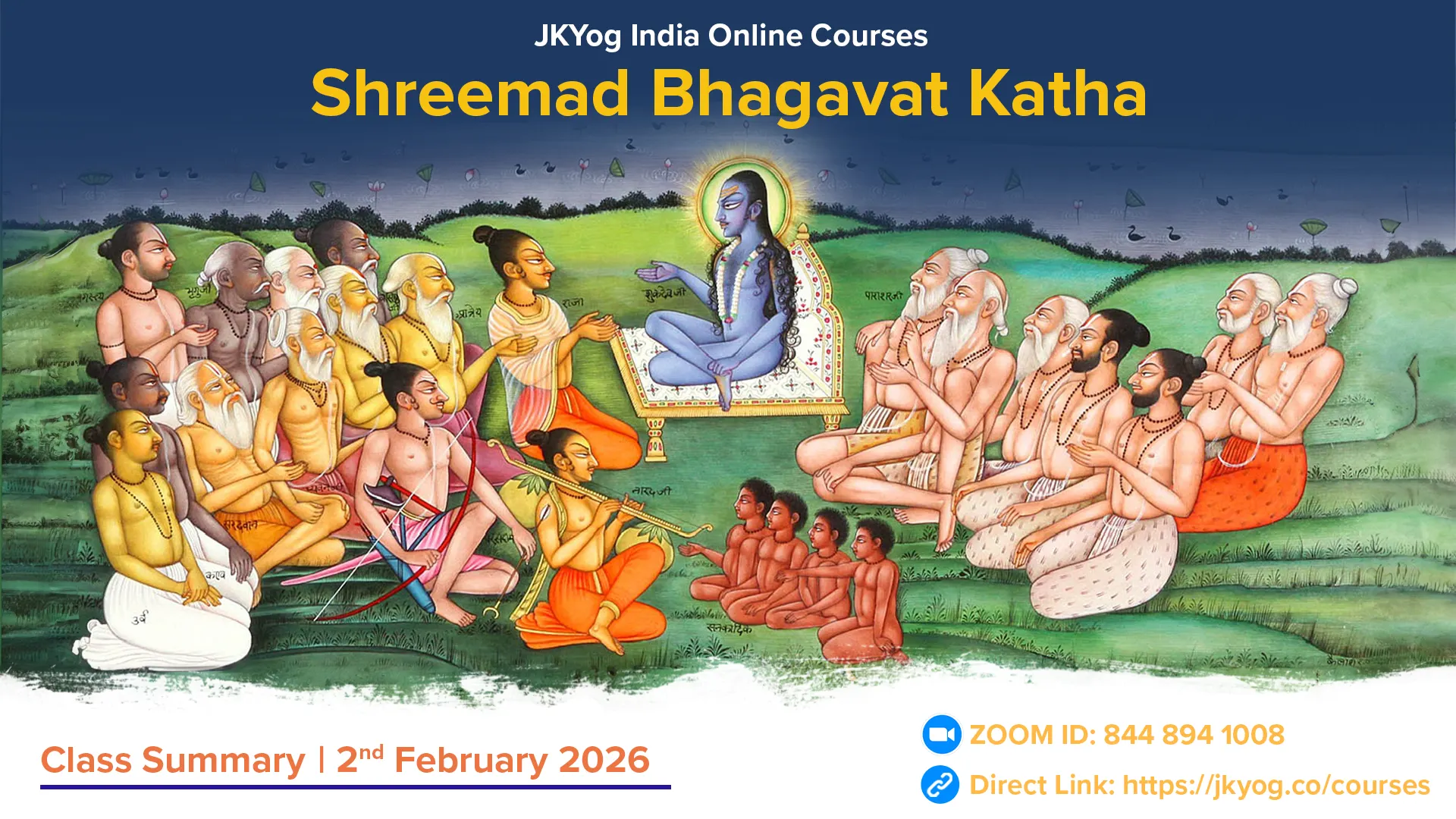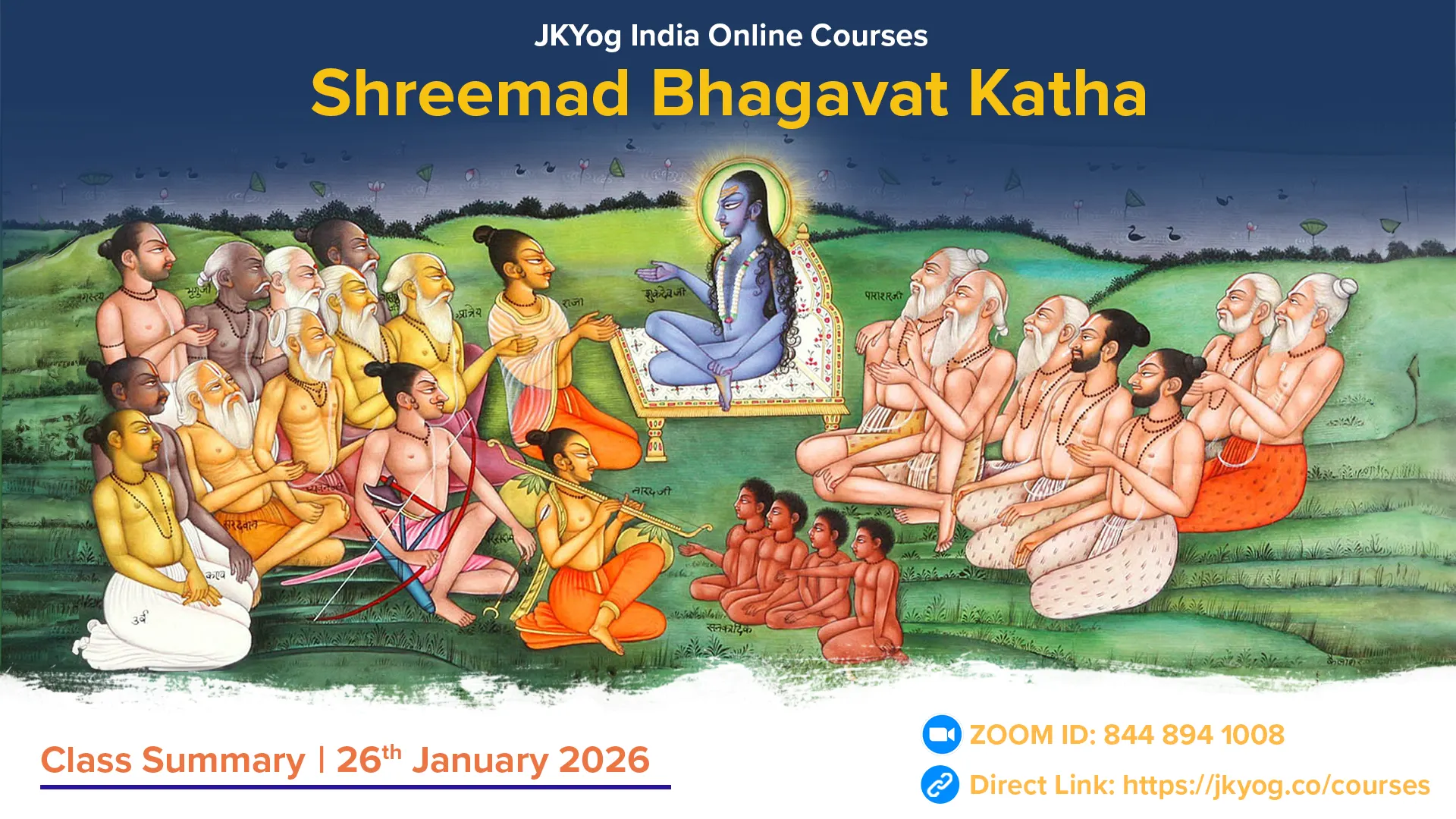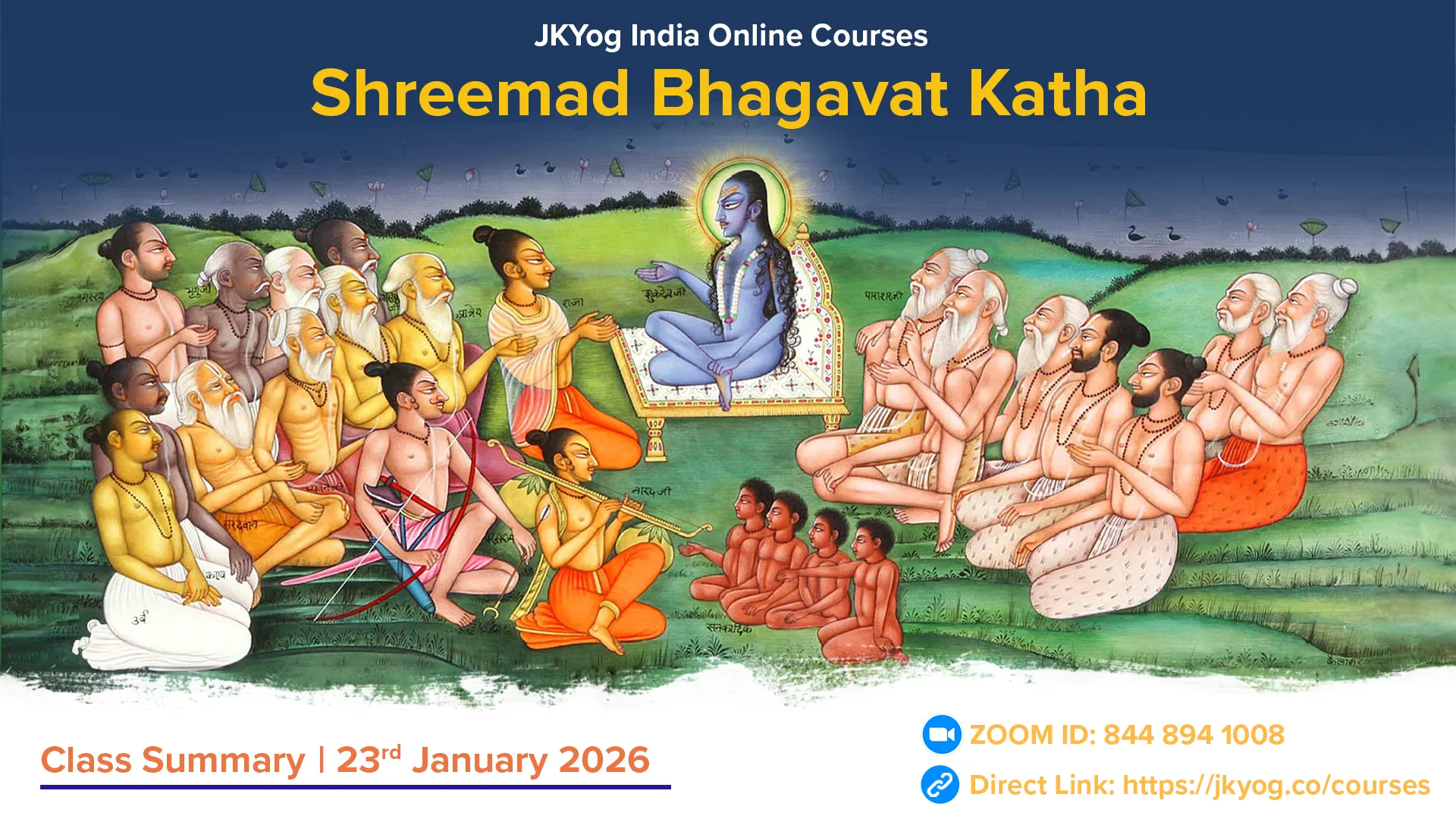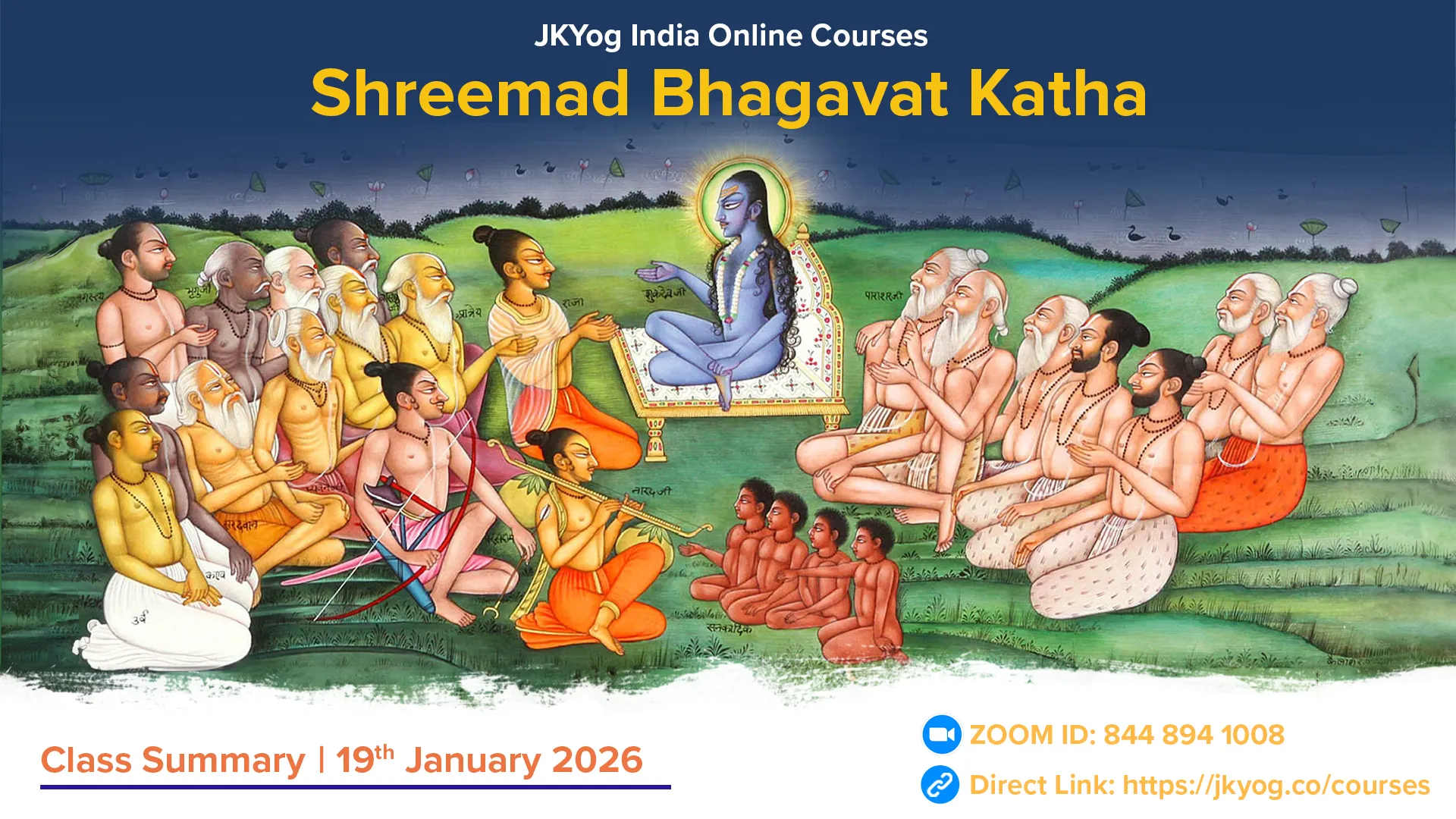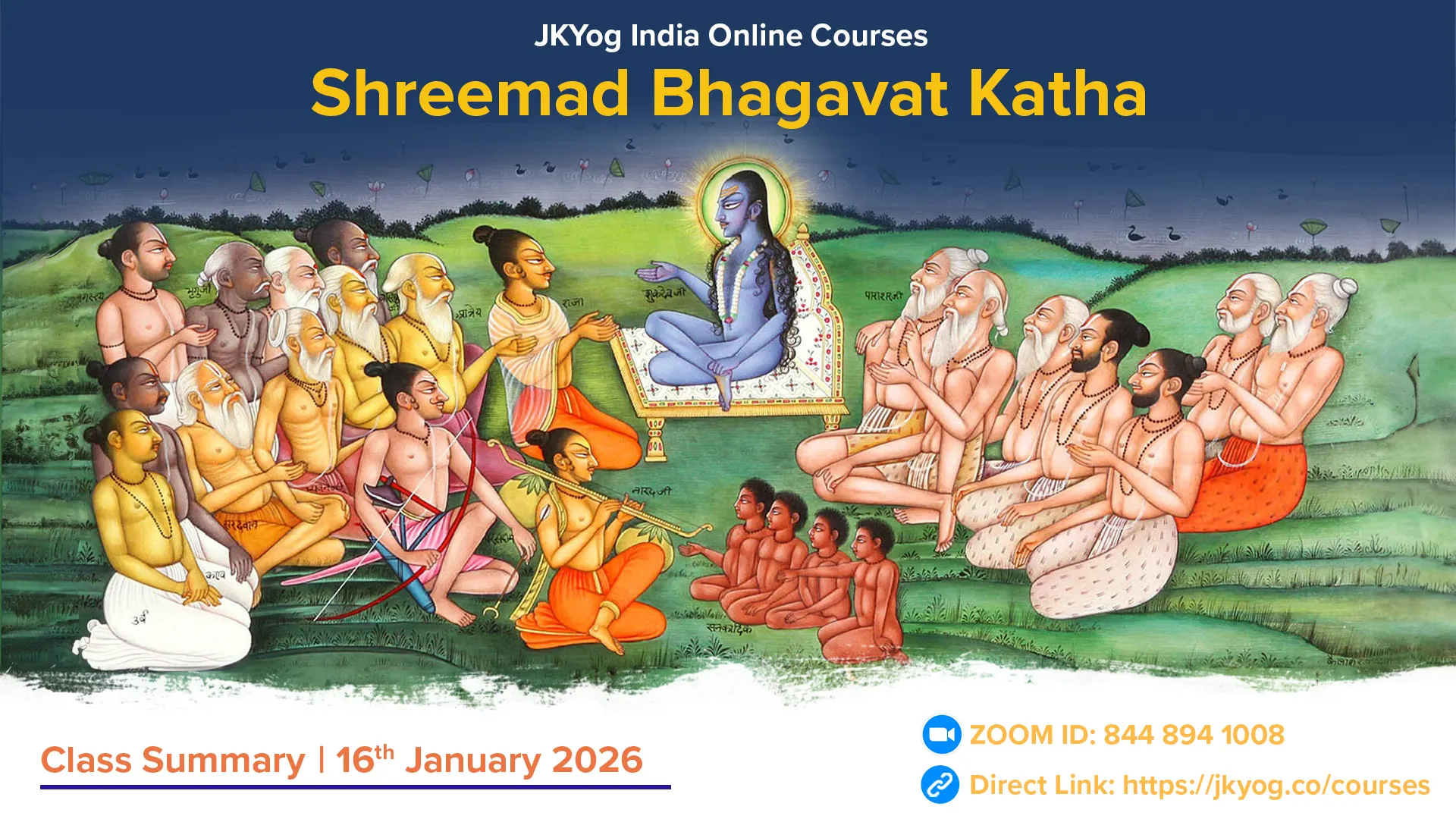Shreemad Bhagavat Mahapuran- Canto: 4, Chapters: 19 to 22
After milking the Earth, Maharaj Prithu resolves to perform a hundred Ashwamedh Yagyas along the banks of the Saraswati River in the Brahmavart region. During the yagya, Bhagwan Hari Himself appears before him. Brahmaji, Rudra, sages, apsaras, gandharvas, and other protectors of the realms also attend the ceremony. Seeing the rising number of yagyas, Indra becomes envious and attempts to disrupt them by adopting hypocritical disguises. Posing as "nagna," "raktambar," and "kapali" (nude, saffron clad and skull-bearing ascetic respectively), he tries to steal the sacrificial horse. Atri Muni notices this and informs Maharaj Prithu's son, who pursues Indra and retrieves the horse. Witnessing his bravery, he is given the name "Vijitashva" (conqueror of the horse).
Indra’s hypocritical actions sow confusion in Dharma, creating false paths that people begin to perceive as righteous. This angers Maharaj Prithu, who resolves to kill Indra. However, the ritviks (priests) stop him and suggest offering Indra to the sacrificial fire instead. When the priests begin this, Brahmaji appears and advises Prithu not to kill Indra. He explains that their conflict will lead to Indra creating more hypocrisy and advises Prithu to make peace with Indra and stop the yagya.
Following Brahmaji’s counsel, Maharaj Prithu concludes the yagya at 99 and befriends Indra. Bhagwan Vishnu, pleased with Prithu's 99 yagyas, appears alongside Indra and explains that Indra regrets disrupting the rituals and seeks forgiveness. Vishnu advises Prithu to forgive Indra, saying that wise and noble souls never bear enmity towards any being, understanding that the body is not the soul.
He further explains that if even a knowledgeable person succumbs to His maya, their penance becomes futile. A wise individual sees the body as merely a tool for ignorance, desires, and actions and does not develop an attachment to it.
Ekah shuddhah svayam-jyotih nirguno'sau gunashrayah
Sarvago'navritah sakshi niratma'tma'tmanah parah
The soul is one, pure, self-luminous, without qualities, the abode of all qualities, all-pervading, free from coverings, the witness of everything, and distinct from other souls. Therefore, it is separate from the body. (Bhagavat 4.20.7)
Ya evam santam atmanam atmastham veda purushah
Najyate prakritistho'pi tadgunaih sa mayi sthitah
The person who understands the soul, residing in the body, as distinct from the body, remains unaffected by the qualities of prakriti, even though they are still connected to it. This is because their consciousness is established in Me, the Supreme Soul. (Bhagavat 4.20.7)
Bhagwan Vishnu’s Teachings to Prithu
- The Importance of Devotion: Bhagwan Vishnu explains that a person who selflessly follows their Dharma and worships Him with devotion attains purity of mind. This purity of mind leads to the realization of the ultimate truth (tattvajnana). With this knowledge, the individual attains the state of equanimity and peace, which is the essence of Bhagwan’s nature.
- Distinction Between the Soul and the Body: Bhagwan Vishnu further explains that one who understands that the soul is merely the witness to the body, knowledge, actions, and mind achieves true liberation (moksha). The soul is beyond the body and free from the cycle of birth and death.
- The King’s Duty and Responsibilities
- Protection of Subjects: Bhagwan emphasises that a king’s foremost duty is to nurture and protect his subjects with justice and fairness. When a king ensures the well-being of his people, he receives one-sixth of the merit (punya) earned by them.
- Consequence of Tax Collection Without Protection: Vishnu warns that a king who merely collects taxes but fails to protect his subjects becomes a participant in their sins. Such a ruler violates their Dharma and ultimately destroys their kingdom.
After giving these teachings, Bhagwan Vishnu asked Prithu to seek a boon. However, Prithu did not ask for material possessions or even liberation. Instead, he humbly requested only one blessing: that he may always meditate on Bhagwan’s lotus feet and constantly listen to the divine stories of His glories. Prithu’s pure devotion deeply moved Bhagwan Vishnu, binding Him in the love of His devotee. Overwhelmed with emotion, Prithu embraced Bhagwan’s feet, and in turn, Bhagwan embraced him warmly. Vishnu then instructed Prithu to follow Dharma and His divine commandments diligently. He assured Prithu that those who obey His instructions achieve welfare in all respects.
Prithu respectfully worshipped Bhagwan Vishnu, along with the devas, sages, gandharvas, nagas, apsaras, and all other beings present. Bhagwan Vishnu, pleased with Prithu’s devotion, blessed him and then returned to His divine abode. Prithu, too, returned to his kingdom.
Maharaj Prithu was a great soul who was revered by all. He governed the Earth with generosity and righteousness, performing many noble deeds. In the end, he attained Bhagwan’s supreme abode, spreading his glory far and wide. Prithu resided in the land between the Ganga and Yamuna rivers, living righteously and exhausting his past karmas through the experiences destined for him. Except for the Vishnu devotees, Brahmins, and those connected to Bhagwan, he ruled unchallenged over all the people of the seven continents.
Once, Maharaj Prithu initiated a grand session. A vast assembly of devas, brahmarishis, and rajarishis gathered at that time. In this sacred gathering, Maharaj Prithu respectfully honoured these distinguished guests and then stood before the assembly, addressing them with humility. He proclaimed, "A seeker must approach saints with questions. I have been made king in this world to protect my people, manage their livelihood, and ensure they remain disciplined. According to the Vedas, fulfilling these duties will grant me, by Shree Hari's grace, access to realms where the fruits of all actions are enjoyed.
"If a king fails to guide his subjects on the path of Dharma and only collects taxes, he becomes a participant in their sins and loses his sovereignty. Therefore, my dear subjects, always remember Bhagwan and fulfil your duties diligently. This will lead to your welfare and mine."
Maharaj Prithu emphasised that Bhagwan Hari is the giver of all rewards. Great souls like Manu, Dhruv, Prahlad, and Bali achieved Dharma, Artha, Kama, and Moksha by seeking His grace. By serving Shree Hari's lotus feet, a soul can be freed from sins accumulated over countless lifetimes and escape the suffering of the material world. He urged everyone to perform their duties according to their varna and ashram while dedicating themselves to Bhagwan through worship, meditation, and praise.
Hearing these inspiring words, the devas, ancestors, and Brahmins praised Maharaj Prithu. They said, "Your virtuous deeds have liberated your lineage from sin. Your devotion and teachings have guided us out of ignorance. You are a true king, and under your rule, we feel as if we are in God’s divine kingdom."
The Sanat Kumaras Teach Maharaj Prithu About the Principle of the Self or Soul
Shree Maitreyaji narrates to Vidurji that while Maharaj Prithu was addressing his subjects, the Sanak, Sanandan, Sanatan, and Sanatkumars descended from the skies. Recognising the sages, Maharaj Prithu and his attendants immediately stand up with reverence. The king welcomes them, performs their worship per the scriptures, and respectfully places the sanctified water of their feet on his head. Maharaj Prithu then humbly addresses the sages:
"O revered Munis! Your darshan’s rare fortune truly blesses me. The homes where saints visit are truly sanctified, even if they are impoverished. Please be gracious and enlighten me—how can human beings easily attain welfare in this world?"
"O revered Munis! Your darshan’s rare fortune truly blesses me. The homes where saints visit are truly sanctified, even if they are impoverished. Please be gracious and enlighten me—how can human beings easily attain welfare in this world?"
Hearing the king's sweet and humble words, Sanatkumars are pleased. Smiling, they begin to reply:
"Sages always speak for the welfare of all living beings, and their association (satsang) benefits everyone. Devotion to the lotus feet of Bhagwan Madhusudan is exceedingly rare and precious. It destroys the deep-rooted desires of the heart, which are otherwise difficult to overcome.
"The scriptures declare that detachment (vairagya) from the body and material possessions, coupled with an unwavering love for the formless, attributeless Brahman, which is one’s true self, is the ultimate means of liberation and welfare."
How can a person easily attain welfare in this world?
Sa shraddhaya bhagavad-dharma-charyaya jijnasaya adhyatmika-yoganishthaya
Yogeshvaropasanaya cha nityam punya-shravah-kathaya punyaya cha
Arthendriya-ramasagoshtya-trishnaya tat-sammat-anam aparigrahena cha
Viviktaruchya paritosha atman vina hareh guna-piyusha-panat
Ahinsaya parama-hamsya-charyaya smritya mukunda-charitagrya-sidhuna
Yamaira-kamair-niyamaishcha-pyanindaya nirihaya dvandva-titikshaya cha
Hareh muhustat-parakarnapura guna-bhidhanena vijrimbhamanaya
Bhaktya hyasangah sada-satyanatmani syannirguna brahmani chanjasa ratih
The scriptures also proclaim that by following these practices, one can cultivate detachment from the material world and develop spontaneous love for the self-luminous, formless Parabrahman:
- Having faith in the words of the Guru and the scriptures, following Bhagavat Dharma, seeking spiritual knowledge (jijnasa), and being steadfast in the path of Yog.
- Worshiping Yogeshwar Shree Krishna and regularly listening to the sacred stories of Shree Hari, which purify the soul.
- Renouncing desires for material pleasures and attachments to things approved by materialistic individuals.
- Finding contentment, delighting in solitude, and drinking the nectar of the divine qualities of Shree Hari.
- Practicing non-violence, following the conduct of the highest of seekers, and purifying the soul through devotion to Shree Krishna.
- Adhering to the principles of Yama (moral discipline) and Niyama (self-control), avoiding excessive accumulation (parigraha), and enduring the dualities of life such as heat and cold.
- Regularly meditating on the qualities of the God and joyfully chanting His virtues with devotion.
- Cultivating faith and love for the formless, attributeless Brahman (the Supreme God), the ultimate truth, and the source of peace in Himself.
By adhering to these principles, one develops detachment from the entire material creation, both its causes and effects, and naturally establishes a deep affection for the attributeless, formless Brahman, the ultimate reality. (Bhagavat 4.22.22–25)
When a person develops firm attachment to God, he surrenders to a true Guru. Then, due to the powerful forces of knowledge (jnana) and renunciation (vairagya), he becomes free from desires and the five types of afflictions—ignorance and others. His ego, represented by the subtle body (linga sharir), is destroyed just like wood is consumed by fire when it appears in the fire and is then burned. Once the subtle body is destroyed, the person is freed from all the qualities associated with action. Before attaining this state, these external and internal experiences were the ones that created a distinction between the soul (jivatma) and the Supreme Soul (Paramatma).
As long as the inner mechanism (antahkaran) remains, the person continues to experience the distinction between the soul, the objects of the senses, and the ego that connects the two. After that, there is no such experience. In the external world, we observe that the difference between the reflection and the object in a mirror or water is only apparent when the mirror or water is present; otherwise, it does not exist.
Those who remain absorbed in contemplating material objects allow their senses to become entangled in these objects, and the mind is drawn towards them. Just as plants like grass at the edge of a water body draw water from it through their roots, in the same way, the senses, absorbed in worldly objects, gradually drain away the intellectual power of the mind.
Bhrashyatyanu smritishchittam jnanabhranshah smritikshaye
Tadroddham kavayah prahuh atmapahnavamatmanah
When the power of contemplation is lost, the ability to remember past and future events fades away. And when memory is destroyed, knowledge is no longer retained. The learned call this loss of knowledge as "self-destruction" or "destroying oneself." (Bhagavat 4.22.31)
Natah parataro loke punsah swartha-vyatikramah
Yada-dhyanyasya preyastvam atmanah swavyatikramat
There is no greater loss in the world than the violation of one's own self-interest. When a person neglects their own true purpose and deviates from their own path, it leads to the greatest harm and downfall. (Bhagavat 4.22.32)
Contemplating wealth and the objects of the senses destroys all of a person’s efforts towards Dharma, Artha, Kama, and Moksha. Such contemplation leads to the corruption of knowledge and wisdom, causing the soul to take birth in stationary forms like trees and other immobile species.
Contemplating wealth and the objects of the senses destroys all of a person’s efforts towards Dharma, Artha, Kama, and Moksha. Such contemplation leads to the corruption of knowledge and wisdom, causing the soul to take birth in stationary forms like trees and other immobile species.
Na kuryat karhichit sangam tamastivram titirishuh
Dharm-artha-kama-mokshanam yad atyantavighatakam
Therefore, anyone who desires to transcend the darkness of ignorance should never become attached to material objects. Attachment to these desires is a major obstacle in attaining Dharma, Artha, Kama, and Moksha. (Bhagavat 4.22.34).
All the emotions and objects that arise from prakriti are transient and impermanent. Time, in the form of Bhagwan Kaal, continually destroys them.
All the emotions and objects that arise from prakriti are transient and impermanent. Time, in the form of Bhagwan Kaal, continually destroys them.
Yat-pada-pankaja-palasha-vilasa-bhaktya
Karma-shayam grathitam udgrathayanti santah
Tadvan na riktamatayo yatayo'pi ruddha
Sroto-ganasta-maranam bhaja Vasudevam
The saints and great souls, by remembering the sparkling brilliance of the fingertips of the lotus feet of the Lord, destroy the ego, which is like a knot in the heart formed by the actions of the past. They do this so completely that even the renunciates, who withdraw their senses and purify their inner hearts, are unable to do so. Therefore, you should worship Bhagwan Vasudev, who is the ultimate refuge for all. (Bhagavat 4.22.39)
Krichchhro mahaniha bhavarnavam aplavesham
Shadvarganakrama-sukhena titirshanti
Tattvam Harer Bhagavato bhajaniyam anghrim
Krutvodupam vyasanam uttara dustararnam
The great ocean of material existence is very difficult to cross, and those who attempt to do so by following the sixfold path of worldly pleasures find it hard to reach the other shore. However, those who take refuge in the lotus feet of Bhagwan Hari, which are worthy of worship and make them the boat to cross this difficult ocean, will effortlessly sail across the tumultuous waves of the worldly ocean. (Bhagavat 4.22.40)
Shree Maitreyiji said, "Vidurji, after receiving the teachings of the principle of the self from Shree Sanatkumars, Maharaj Prithu praised them. King Prithu said, 'O Bhagwan, whatever I have received, it is all the grace of Shree Hari. Everything I possess is offered at Your divine feet. The kingdom, the army, the land, and all the resources belong to You. Indeed, the right to rule is granted to the learned Brahmins who know the Vedas and scriptures. No one can repay Your favour, so what can I offer in return? Your kindness is so great that it cannot be repaid.'
Maharaj Prithu's rule was very gentle and generous. Like the Sun, he exerted his influence on everyone, giving timely charity to his subjects and nurturing them. He had five sons with his wife Archika—Vijitashva, Dhoomrakesh, Hariksh, Dravin, and Vrik. Due to his dutifulness and virtuous qualities, he assumed a protective role for all beings in the world. He was an emperor, and his qualities were like those of other deities, such as Yamaraj's punishment, Kubera's wealth, Indra's invincibility, and Bhagwan Shankar's radiance. His strength and virtues were admired throughout the three worlds.
Summary: JKYog India Online Class- Shreemad Bhagavat Katha [Hindi]- 6.12.2024

